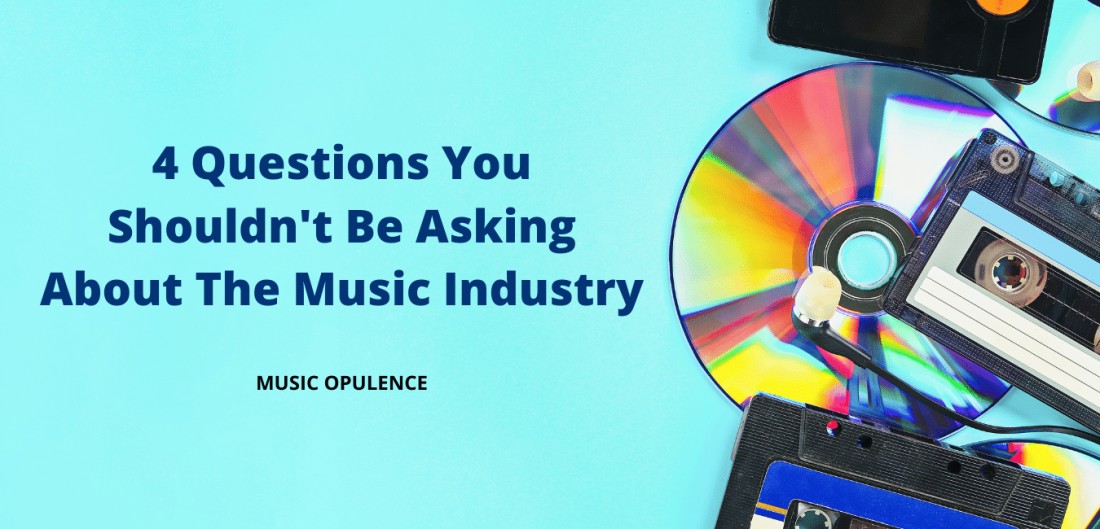Table of Contents
![]()
You’re probably already sabotaging your chances of success in the music industry because you believe in one or more music career myths. How do I know this? Hundreds of musicians send me e-mail messages on a daily basis (all seeking the answers to the WRONG questions). These are questions that may appear to be good on the surface, but are actually highly damaging questions that will lead them far away from their musical dreams.
To launch a successful music career as soon as possible, you must understand the questions you should not be asking, as well as how to ask much higher quality questions that will put you on the right track toward achieving your music industry goals.
These are the four worst music career questions you should never ask if you want to be a successful professional musician:
(1) Is It Necessary For Me To Become A ‘Starving Artist?’
Many people believe that making a living as a professional musician means one of two things: either you’make it’ and go on to tour the world and sell millions of albums, or you ‘become a starving artist’ and have to play at crappy bars and street corners to make ends meet. This music business myth sabotages people’s careers from the start, either by convincing them that they need to work full-time jobs unrelated to music and ‘try to do music on the side,’ or by making them fearful of entering the music business.
The music industry, in fact, has a sizable middle class, and there are numerous ways to make a living. You’d be surprised how easy it is to make a good living in the music industry as opposed to becoming successful in another field. However, before you can make a lot of money, you must stop asking bad questions. Stop worrying about becoming a starving artist and start thinking about how you can make money as a musician.
Working in the music industry does not require you to live paycheck to paycheck, as it would in a regular day job. Instead, earning multiple sources of income at the same time is always possible. Because you don’t have to rely on just ONE source of income, becoming a professional musician is a much more stable career choice. Aside from the obvious ways that musicians seek to make money in music (selling albums/downloads, performing live shows, or recording as a session musician), there is one thing you can do right now that will significantly increase your music-related income:
Begin building a music teaching business. This will immediately generate multiple sources of income for you (your students) while you work far fewer than full-time hours each week.
When you develop multiple sources of musical income, as discussed above, it is very possible (and not as difficult as you might think) to earn more than $100,000 per year in your music career (I know this because I’ve helped many musicians do it).
(2) How Do I Get A Recording Contract?
To understand why this is a bad question to ask, consider the following: “Why should someone give YOU a recording contract?” If you believe it’s because you write good music, think again. This is never a good enough reason to sign a recording contract with you. Nobody will invest tens of thousands of dollars in you simply because you can write good music. This would be a WAY too risky investment (to the point where it doesn’t even make sense). If you had saved up $200,000, would you go to a casino and risk it all on one spin of the roulette wheel? OR would you rather put your money into someone who has proven that they can help you earn more (at least on a smaller scale)? Without a doubt, you would make the wise decision to invest it in someone who could assist you in making more money. This is how record companies think. So, instead of wondering how to get signed to a recording contract, start transforming yourself into a ‘wise investment’ that any label would immediately recognise as valuable. This necessitates far more than simply writing great music, mastering your instrument, or having a Facebook page.
Here are the steps you should take to position yourself as a valuable investment for a record label:
- Learn what the music industry is looking for in musicians before starting to work with them.
- Put in the effort every day to advance your music career. Before they will work with you, record labels want to see that you have a good track record. The more you do as an independent musician, the more likely it is that a record label will be interested in you.
- Receive music industry training from a successful mentor who has already achieved great success in the music industry and assisted others in obtaining recording contracts.
When you start developing your music career on your own, you will become a beacon of light, and record labels will come looking for YOU!
(3) How Can I Get More People to ‘Hear’ My Music?
The majority of musicians want as many people to hear their music as possible, believing that doing so will help them earn money and become successful professional musicians. The number of people who listen to your music, however, is not particularly significant in and of itself. What matters most is the number of people you can convert into die-hard fans who will go to any length to support you and your music.
Stop wondering how to get more people to hear your music and start converting anyone who is already a fan into a true FANATIC. Only after you’ve developed a strategy for converting “casual fans” into “hardcore fanatics” will the total number of people who hear your music start to matter.
(4) Where Is the Best Music City to Live?
Many musicians believe that relocating to a “music city” will increase their chances of success in the music industry. With this belief in mind, they pack their belongings and relocate, believing that opportunities will simply “fall into their laps” once they arrive. When they have been in their new location for a while and nothing has changed, they blame it on the city and look for a new location to relocate to (while being completely unaware of the TRUE reasons for their failure).
The truth about ‘location’ leading to success in the music industry is as follows: Your geographical location has nothing to do with your ability to become a successful professional musician. This is especially true today, when it is easier than ever to land a recording contract, release music, organise world tours, or work as a session musician regardless of where they live. Highly successful musicians do not become so because they grew up in one location rather than another. If that were true, there would be no successful musicians living in cities with small music scenes. The principles that lead to the development of a successful music career are the same no matter where you live.
Rather than putting in the time and effort to find the best music scene, go through the following process, which has been PROVEN to work for musicians:
- Determine your specific musical objectives.
- Begin working with a music business mentor to develop an effective strategy for achieving your musical goals.
- Work every day to get closer to your goals until you achieve them.
When you concentrate on what is most important (using the process outlined above), you will achieve success in your music career much more quickly.
Now that you understand why many common music career questions actually steer your music career in the wrong direction, here’s what you need to do to get back on track:
Step 1: Consider your music career goals in greater depth. Use the resources in this article to learn more about the music industry.
Step 2: Begin asking yourself high-quality questions on a regular basis when attempting to figure out what you need to do to achieve your music career goals.
Step 3: Don’t try to build your music career on your own. Get music business training if you want to make a name for yourself in the music industry.
Share This





Be the first to comment